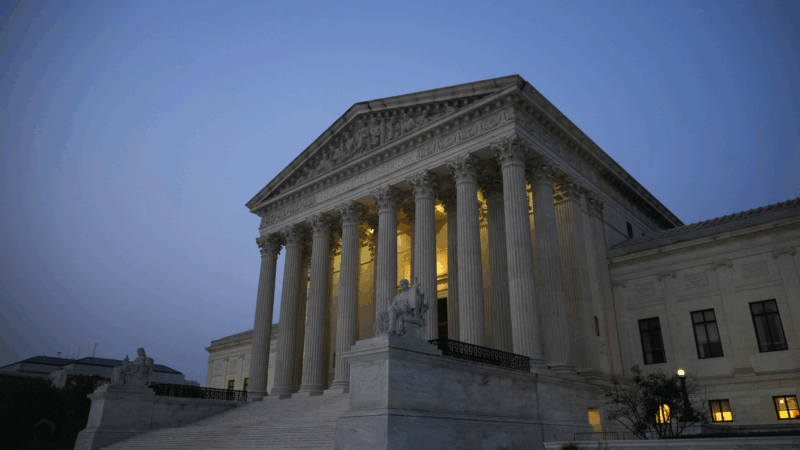Supreme Court press corps asks chief justice to live-stream court’s opinions
Members of the Supreme Court press corps released a public letter Wednesday asking that the audio of the court’s opinions and oral dissents be streamed online. The letter was originally sent to Chief Justice John Roberts privately one year ago, and has not received a response.
The signatories were representatives from all the major radio and TV networks as well as the newspaper and news agencies that cover the court, including NPR.
As it stands now, over the coming days as the U.S. Supreme Court announces a variety of highly significant decisions from the bench, only the lawyers, public attendees and members of the press corps who happen to be in the courtroom will hear directly from the justice of the opinion as he or she reads a summary of the decision.
The audio of that announcement will not be available until the next term begins in the fall, when it can be listened to at the National Archives or on the Oyez website.
The letter notes that the court began providing live audio of oral arguments in 2020 when the pandemic prevented the justices from hearing oral arguments together. Until then the court had resisted broadcasting oral arguments except in very rare cases, such as Bush v. Gore, the case that decided the 2000 election. But after the pandemic subsided and normal arguments resumed, the court continued the practice of live-streaming oral arguments — though continued to bar live streaming of opinion announcements.
The letter argues that while the justices would like people to read their opinions in their entirety for themselves, most people will not devote the hours needed to do that. It goes on to say that “in this era of misinformation, providing live audio of opinion announcements would allow the Court to speak directly to the American people on issues of extraordinary importance.”
It concludes that “just as the Court’s live streaming of oral arguments has made your work accessible to a much wider audience, taking the next stop to allow the court’s opinion announcements to be heard in real time will lead to greater understanding and appreciation of the court’s final decisions.”
Federal judge acknowledges ‘abusive workplace’ in court order
The order did not identify the judge in question but two sources familiar with the process told NPR it is U.S. District Judge Lydia Kay Griggsby, a Biden appointee.
Top 5 takeaways from the House immigration oversight hearing
The hearing underscored how deeply divided Republicans and Democrats remain on top-level changes to immigration enforcement in the wake of the shootings of two U.S. citizens.
Snowboarder Chloe Kim is chasing an Olympic gold three-peat with a torn labrum
At 25, Chloe Kim could become the first halfpipe snowboarder to win three consecutive Olympic golds.
Pakistan-Afghanistan border closures paralyze trade along a key route
Trucks have been stuck at the closed border since October. Both countries are facing economic losses with no end in sight. The Taliban also banned all Pakistani pharmaceutical imports to Afghanistan.
Malinowski concedes to Mejia in Democratic House special primary in New Jersey
With the race still too close to call, former congressman Tom Malinowski conceded to challenger Analilia Mejia in a Democratic primary to replace the seat vacated by New Jersey Gov. Mikie Sherrill.
A daughter reexamines her own family story in ‘The Mixed Marriage Project’
Dorothy Roberts' parents, a white anthropologist and a Black woman from Jamaica, spent years interviewing interracial couples in Chicago. Her memoir draws from their records.






